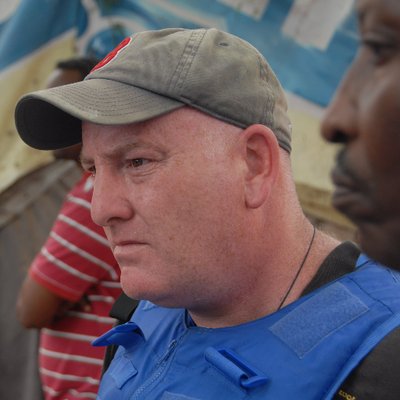In the years since he graduated, Justin T. Brady has gone on to serve as an agent for peace, from his time in the Peace Corps to now, working for the United Nations.
When Brady, ’91, was accepted into the Peace Corps after graduation, he thought he’d be serving somewhere in Latin America. Despite the fact that Brady grew up as a fluent Spanish speaker, and majored in Latin American studies in addition to political science, his time spent learning Portuguese at the University of Rhode Island was much more useful.
For two years, Brady taught English in the small West-African country of Guinea-Bissau. The time he spent serving there shaped the rest of his career and ultimately changed his life.
“Where I was located in Guinea-Bissau I visited another volunteer’s village which was about eight kilometers from my little town that I was in,” Brady said. “We said ‘Oh, we’re going to go for a walk out in the woods here,’ and they were like ‘Ok, just stay on the path because there’s still some explosive stuff from the war with the Portuguese.”
Guinea-Bissau has been independent of Portugal since the mid-’70s, but many landlines placed in fields throughout the country during a guerilla-warfare fight for independence still remain. Hazards like this, according to Brady, prevent people from freely moving about.
Brady also attributed reading “The English Patient,” a novel written by Michael Ondaatje in 1992, which discussed explosive ordinance disposal, to heavily influencing his decision to pursue a graduate degree in international development at Clark University. During his time there he focused his studies on the impact of explosive ordnance disposal and land mines.
The participatory methodologies and surveying he learned at Clark University were put to direct use in Yemen, where he worked with citizens to determine where they believed landmines were still buried and which ones were causing the most harm. The process of removing landmines can take weeks or even months, according to Brady, but community input is extremely helpful to the process.
Before taking his first assignment with the United Nations in Yemen in 1999, Brady also worked for a number of Non-Governmental Organizations along the way. Through his service with the Peace Corps, work with NGOs and the United Nations, Brady has visited more than 40 countries and speaks five languages “relatively well.”
As the current Head of Office for the United Nations Office for the Coordination of Humanitarian Affairs (OCHA) Somalia, Brady works with state and federal representatives to coordinate humanitarian needs. During his time there he has successfully helped to prevent a famine.
Rather than work remotely out of Nairobi, Kenya like other heads of office, Brady went against the status-quo and chose to base himself out of Mogadishu. Mogadishu is considered to be one of the worst field office locations, according to Brady, and was also the site of a recent terrorist attack.
On Oct. 14, a truck bomb detonated in the middle of downtown Mogadishu, killing 358 people. Although United Nations workers don’t have the ability to move about the city freely outside their headquarters, one of Brady’s neighbors was among those who were killed that day. The attack forced many people to quickly spring into action, but it was also a cause for concern and worry for Brady’s wife and three children living back in the Netherlands.
Brady’s friend, colleague and the current Head of Field Coordination for OCHA Iraq Gemma Sanmartin admires his work ethic and commitment to better serving the people of Somalia, as well as other United Nations workers.
“I think Justin has always been a key pillar for OCHA staff, national and international,” Sanmartin said. “The way he always keeps in mind our security and our safety is paramount for him.”
Although Brady has considered leaving the United Nations to live a more quiet and risk-free life, or even just serving somewhere else, he ultimately chooses to remain in Mogadishu to better serve to people and needs of Somalia.
“I didn’t come to work on Somalia, I came to work in Somalia,” Brady said.





